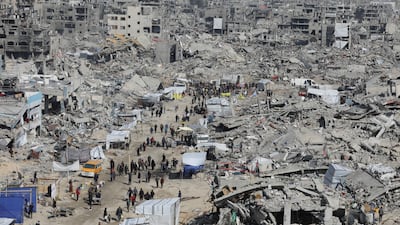Live updates: Follow the latest on Israel-Gaza
Clearing the tonnes of rubble left in Gaza by the 15 months of Israeli bombardment could take far less time than the UN previously estimated, under the right conditions and if the Israeli blockade is removed, experts told The National on Wednesday.
A UN reconstruction official said the agency's assessment last year of debris removal requiring at least 15 years for completion is being used by the US as a pretext to legitimise displacing the enclave's population of 2.3 million Palestinians.
"This is the highest figure I've heard – and now the issue is becoming very political," one UN expert said, referring to Israel's banning of necessary machinery such excavators from entering the Gaza Strip. "The rubble can be removed in way less time if the blockade is removed."
UN agency for Palestine Refugees (UNRWA) had estimated that clearing the Gaza Strip of rubble will take 15 years and cost $500 million to $600 million, based on a UN Environment Programme report.
Ahmad Al Dalou, Deputy project manager of the Gaza Reconstruction Committee at Qatar's Ministry of Foreign Affairs, told The National that the US's touting of the 15-year figure is "proof that they do not have the intention of rebuilding quickly".
"In my opinion, as an engineer who worked in reconstruction in Gaza, all the rubble could be cleared in a time period of no more than two years if the necessary equipment was brought in, and the Strip was split into sections. The work could be done in parallel to remove the destroyed buildings," he said.
Mr Al Dalou also said that the majority of the human cadres required for reconstruction and rubble removal already exist in Gaza.
The UN, which has created a specialised task force to deal with the removal of debris, has also said rubble contains human remains and unexploded ordnance that pose a danger to people.
The issue, however, has become politicised by the US so it can argue in favour of displacing the entire population of the Gaza Strip, the UN source said. "The Americans are playing on this fact to say people in Gaza need to leave," they said.
On Tuesday, US President Donald Trump said his country was going to take over Gaza and resettle Palestinians elsewhere. His comments followed his earlier calls last month to "clean out" Gaza, pushing for the "evacuation" of its people into Jordan and Egypt, which prompted international outrage and condemnation.
But the complete displacement of Gaza's people is not a necessity in order to complete rubble removal and reconstruction, Mr Al Dalou said.
"There are only probably two areas that are completely destroyed and where people cannot be present - but people can still be settled in camps or mobile homes nearby until that work is completed," he added.
Gaza is currently in the first of a three-phase ceasefire that began on January 19. The current stage of the fragile cessation of hostilities between Hamas and Israel will involve the release of 33 hostages from Gaza into Israel in exchange for hundreds of Palestinian detainees being freed from Israeli jails.
During the second phase, the release of the remaining hostages and withdrawal of Israeli troops from the strip will be the focus, while the third covers reconstruction of Gaza, where up to December two thirds of the pre-war structures had been damaged or flattened, according to UN satellite data. That amounts to about 69 per cent of the structures in Gaza. At least 90 per cent the population has been displaced.
Days after the ceasefire began, the Rafah border crossing opened for the first time since its closure last May, allowing aid to enter and patients to depart for medical treatment abroad. It has not been open for anyone wanting to return to Gaza.
"We all know that the reconstruction is phase three of the ceasefire agreement – so the Israelis plan to make people leave Gaza voluntarily and the way to do that is to delay the reconstruction, so people want to leave because there is nothing left for them to live for inside," the UN source added.
Part of the first phase of the ceasefire deal includes bringing in 60,000 caravans and 200,000 tents but more than 17 days since it came into effect, that has not happened.
"Israel is delaying bringing in temporary housing and tents, as well as heavy equipment needed for the reconstruction as part of the humanitarian protocol of the agreement," the source said.

